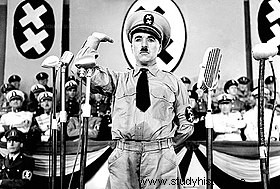
One of Chaplin's famous movies is "The Dictator".
It was a movie that was completely ironic to Hitler, but in modern society the image of a "dictator" is very bad.
Perhaps it was from the end of the Roman Republic that the image of the dictator began to deteriorate, but it can be said that it was this "dictator" system that made Rome strong in both peacetime and emergencies.
This time we talk about such a dictator.
The term of office is 6 months, and the number of people is 1. The authority is enormous.
The Roman Republic transferred the authority of the king to the consul, which had a term of one year and two people, when it was transferred from the royal system.
I would be grateful if you could refer to the following article about the Roman Consul Consul.
In an emergency, having two consuls may be inconvenient, or may require the presence of a stronger decision-making body. In such a situation, the Consul could nominate a dictator.
The dictator only needs to be nominated by one of the two consuls, who have tremendous authority over Roman military and financial affairs and all other areas. Because of its strength, its popularity is shorter than that of the Consul for a year, and the number of people is probably one.
It can be said that it is a Roman system that dislikes the concentration of power, although it unites as a whole country in an emergency.
When Dictator was appointed, the two Consuls came under his command, and even the tribune could not overturn the decision. The dictator was given the imperium, which is the commander of the army, which later became the etymology of the Empire and the Emperor. Later, he had a strong authority to command 300,000 Roman troops, including 150,000 standing armies and 150,000 reserve troops, and could be said to be the most powerful person in the world.
However, there were some harmful effects.
Later, with his strong authority, he called himself " lifetime dictator . Something that can take the position of "has appeared. Sula and Caesar.
Caesar will be assassinated by the Senate, who felt the crisis of democracy.
After that, the dictator system was abolished by Antonius, and no one has taken the position of Dictator since Caesar.
* Sula himself left the position of Dictator for the rest of his life.
The first dictator was appointed to Titus Larcius during the fight against the Sabines in 501 BC.
In the 500-year history of the Roman Republic, the need for a dictator was rare, with only seven being appointed during the nearly 100 years between the first appointment of the dictator and the invasion of the Celts in 390 BC.
It seems that the Romans were afraid of the Celtic invasion when Rome was half-destroyed, and the hero Camillus of the same period was appointed as Dictator five times.
It is said that Dictator could appoint an assistant cavalry secretary (Magister Equitum), and that Camillus appointed a commoner there, so that the status of the commoner was raised and the Likinius Sextian law could be enacted. ..
After the Punic Wars, when the supremacy of Rome in the Mediterranean was decided, the need for dictator was reduced, and the moment Augustus abandoned the appointment of the Senate during the transition to imperial rule, the system disappeared.
Although Dictator has a strong image of a dictator, Hortensius, who is famous for the Hortensius law, has also been appointed as Dictator, and his power is not necessarily abused.
